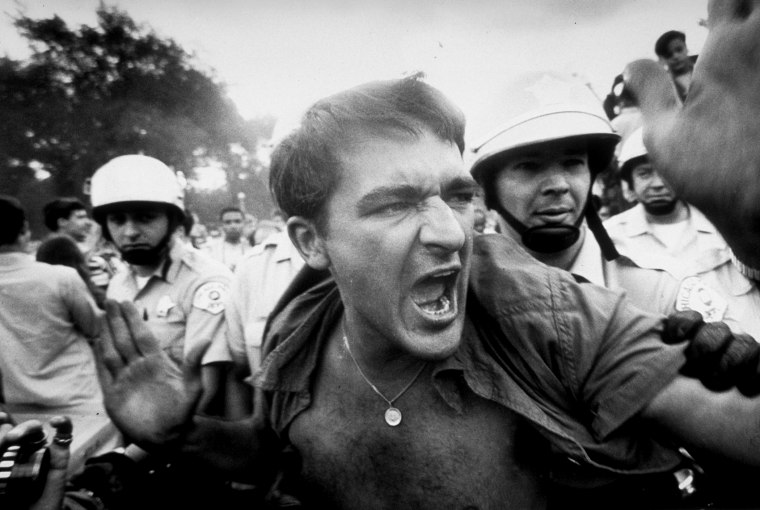CHICAGO - The modern Democratic Party has always had its internal divisions. Right now, in the run-up to the 2016 presidential contest, many partisan Democrats support the presumptive candidacy of Hillary Clinton while some so-called "economic populists" are seeking a challenger to attack Clinton from the left. But no matter how intense the conflict between those two camps becomes, it probably won't have anything on the 1968 Democratic National Convention in Chicago. That was where American liberalism cracked wide open, police truncheons bloodied countless anti-Vietnam protesters, and the party itself was severely hobbled by civil strife.
That outcome might not have been inevitable, but certainly all the ingredients for a combustible situation were present from the beginning. President Lyndon B. Johnson's tenure had already fractured the Democratic Party; liberals hated the White House for stepping up U.S. involvement in the Vietnam War, while Southern Dixiecrats were defecting over Johnson's push for civil rights legislation. When Johnson decided not to pursue another term in office, he set the stage for a vicious battle between the establishment candidate, Vice President Hubert Humphrey, and Humphrey's anti-war challengers.
The conflict came to a head outside outside the convention hall in downtown Chicago, where tens of thousands of anti-war protesters had massed. The city's response, orchestrated by Democratic Mayor Richard Daley, was swift and brutal. A federal investigation later found that a "police riot" was to blame for the bulk of the violence.
Todd Gitlin, now a professor at Columbia University, attended the Chicago protests as a reporter for the left-wing publication Ramparts. He said he witnessed "confrontations," but was absent for most of the real violence between police and protesters.
"The police were central, were decisive in the violence, but it wasn't just a matter of police," Gitlin said. "It wasn't just a matter of a couple of beserkers working for the police. The policy was to disrupt demonstrations, to humiliate the protesters."
While he maintains that "there wasn't actually that much violence except by the police," Gitlin said a small contingent of protesters were certainly "at least favorably inclined toward violence, whether it meant smashing a window her or there, or throwing something at the cops." In the end, roughly 650 people were arrested. Reports differ on the number of people injured.
Humphrey eventually won the nomination, but it wasn't much of a victory. As the historian Rick Perlstein wrote in Nixonland: "[Was] he leading a party, or a civil war?" Liberal Democrats were appalled by what had occurred in Chicago. Dixiecrats were already flocking to Republican nominee Richard Nixon, thanks in part to his campaign's innovative "Southern strategy." Nixon prevailed in the general election ushering in a Republican wave that prevailed for almost 30 years, not counting Jimmy Carter's brief tenure in the Oval Office.
Nearly half a century later, the Democratic Party is no longer the wounded animal it was in 1968. But it is certainly a party shaped by those three decades in the wilderness. The next time a Democratic convention was held in Chicago, in 1996, the party united to renominate the centrist Bill Clinton to a second term. Today, it's still very much his party.
This is part of msnbc.com's "Road Trip " series, which has msnbc.com reporters traveling across the country to profile movements that sparked change in America. For more, click here.
